Exporting and Importing Exchange Auto Attendant Prompts
While cloning a customer’s environment in prep for a cross-forest move to a resource forest, I needed to duplicate the auto attendant configuration. This included a slew of custom auto attendant prompts. I looked all around the current servers to see if the original .wav files were anywhere, and only managed to find a few. So I resorted to Export-UMPrompt to just export all of the prompts to .wav files. The plan was to then take those .wav files and import them on the new servers in the resource forest.
For each prompt, I used something like this:
$prompt = Export-UMPrompt -UMAutoAttendant "Qatar Service Desk" -PromptFileName "Qatar_NormalBusinessHours.wav" Set-Content -Path "c:\umprompts\Qatar Service Desk\Qatar_NormalBusinessHours.wav" -Value $prompt.AudioData -Encoding Byte
This yielded me a .wav file that I was able to open with Windows Media Player and verify the contents. So far, so good.
However, when I went to import this on the new server using Import-UMPrompt, using something like:
[byte[]]$c = Get-content -Path "c:\UMPrompts\Qatar Service Desk\Qatar_NormalBusinessHours.wav" -Encoding Byte -ReadCount 0 Import-UMPrompt -UMDialPlan "Contoso Qatar Dial Plan" -PromptFileName "Qatar_NormalBusinessHours.wav" -PromptFileData $c
I was presented with this:
As Sheldon from The Big Bang Theory may say “oh – what fresh hell is this?”. You’d think that if you export a prompt, it would give you a file that is supported for import, right? Not so fast. Seems that the exported files are 16Khz, but, as the error above states, we need 8Khz. And ONLY 8Khz. And the Export-UMPrompt doesn’t provide a parameter to specify the exported file properties (wouldn’t that be nice?).
So we turn to some quick shareware software called GoldWave.
Once installed, open GoldWave, and then click the Open button, and open your .wav file.
Then click the little “Hz” button on the toolbar, and set the sample rate at 8000, as shown below:
You will notice that at the very bottom of the GoldWave window, it now says something like “Wave PCM signed 16 bit, 8000 Hz, 128 kps, mono”. Click File>Save As.
Choose “Wave (*wav)” as the Save As Type, and set the Attributes to “PCM signed 16 bit, mono”.
After I did this for each of the files, they imported fine.









Follow Me